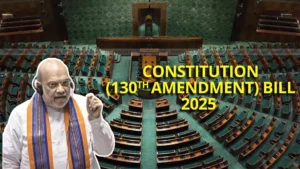GS2 – Polity

Context:
The 130th Constitution (Amendment) Bill, 2025, introduced by the Home Minister, was referred to a Joint Parliamentary Committee for scrutiny. The Bill proposes changes to Articles 75, 164, and 239AA, which govern the Union Council of Ministers, State Councils of Ministers, and the special administrative arrangements for Delhi.
Major Provisions:
- Article 75 (Union Ministers):
- If a Union Minister is arrested and detained for 30 consecutive days for an offence carrying imprisonment of five years or more, the President must remove them on the advice of the Prime Minister.
- If no advice is given by the 31st day, the Minister automatically ceases to hold office.
- Reappointment is allowed post-release.
- Article 164 (State Ministers):
- Similar provisions apply to Chief Ministers and State Ministers, with removal executed by the Governor.
- Article 239AA (Delhi Ministers):
- The same rule applies to Delhi’s Chief Minister and Ministers, with the Lieutenant Governor empowered to act.
- Government of Union Territories Act, 1963:
- Extends these provisions to Union Territory Ministers, granting the Administrator or LG similar authority.
- J&K Reorganisation Act, 2019:
- Applies the same framework to Jammu & Kashmir, enabling the LG to remove the CM or Ministers.
Implications for Governance:
- Strengthens accountability and addresses ethical lapses among Ministers facing criminal charges.
- Reinforces constitutional integrity and public confidence in democratic institutions.
- For example, the Supreme Court in Arvind Kejriwal’s case allowed restrictions but left resignation to discretion.
Concerns Raised:
- Potential for constitutional overreach and misuse against political opponents.
- Undermines the presumption of innocence and principles of natural justice.
- Risk of political influence over arrests and investigations via investigative agencies.
Legal and Judicial Perspectives:
- Supreme Court Rulings:
- Manoj Narula v. Union of India (2014): No constitutional prohibition exists against appointing individuals with criminal backgrounds as Ministers.
- 2018 ruling: Parliament holds exclusive power to legislate disqualification grounds; recommended stronger party laws to revoke membership of charged politicians.
- Law Commission Recommendation: Disqualification should apply only after framing of charges, not merely on chargesheets or complaints, to maintain fairness.




